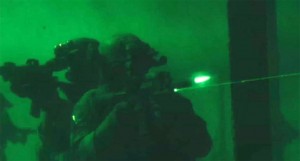Zero Dark Thirty
Posted on January 10, 2013 at 6:00 pm
A-| Lowest Recommended Age: | Mature High Schooler |
| MPAA Rating: | Rated R for strong violence including brutal disturbing images, and for language |
| Profanity: | Constant very strong language |
| Alcohol/ Drugs: | Drinking, smoking |
| Violence/ Scariness: | Intense and disturbing wartime images including torture and terrorism |
| Diversity Issues: | Diverse characters |
| Date Released to Theaters: | January 11, 2013 |
| Date Released to DVD: | March 18, 2013 |
| Amazon.com ASIN: | B00B1E6FF8 |
It begins with heart-breaking audi o of 911 calls from the World Trade Center on September 11, 2001. A frantic woman who asks if she is going to die is soothed by the operator until she is suddenly gone and we hear the operator’s dawning understanding of the magnitude of the disaster.
o of 911 calls from the World Trade Center on September 11, 2001. A frantic woman who asks if she is going to die is soothed by the operator until she is suddenly gone and we hear the operator’s dawning understanding of the magnitude of the disaster.
And then it is two years later and we are watching the torture-aided interrogation of a detainee in Pakistan. Dan (Jason Clarke) is forthright and almost clinical as he tells Ammar (Reda Kateb) that he will hurt him for every lie. The interrogation is witnessed by a new arrival who we will know only as Maya (Jessica Chastain). She turns down the chance to stay outside the room. “There’s no shame if you want to watch from the monitor.” Maybe she is proving something to Dan, maybe she is proving something to herself, maybe she is so intent on finding Osama Bin Laden that she wants to make sure she does not miss a detail. Probably all three.
Director Kathryn Bigelow brings that same intensity of focus to telling the story that Maya brings to the search. After “The Hurt Locker,” Bigelow, the first woman to win the Best Director Oscar, re-teamed with screenwriter Mark Boal to make a movie about what they thought would be the unsuccessful search for Bin Laden. Their project was overtaken by events as Bigelow and Boal were all but embedded with the military and CIA to do their research in real time, giving the movie an intimate, gritty, documentary feel.
Maya goes to work. “You don’t think she’s a little young for the hard stuff?” one of her new colleagues asks. “Washington says she’s a killer.” This is not a movie where we go home with the heroes and see them hug their children. It is not a movie where we see them struggle with their demons or sit down over drinks to give us endearing details about their lives or explain why they do what they do. At one point, Maya is asked about her background and she says she has done nothing since she got out of school but look for Bin Laden. She acknowledges that there is a reason she was particularly suited for this task, but she never reveals it. This is the story of hard-working, even driven professionals who have to make life or death decisions all the time, about what it takes and about the price they pay.
People come and go in the story. A new President is elected and the policy on torture changes.* The policy on the level of certainty required as a basis for action changes, too. Dan goes back home. “I need to do something normal for a while. I’ve seen too many guys naked.” And, he says, “You don’t want to be the last one holding a dog collar when the oversight committee comes.” Some of the CIA and military investigators are killed and she is attacked. But then there is a breakthrough and she has another challenge — persuading the military and the politicians that she is right about where Bin Laden is hiding. James Gandolfini, Mark Strong, Jennifer Ehele, and Kyle Chandler are all outstanding as Maya’s colleagues.
And then it is time to bring in Seal Team 6. The attack is brilliantly staged, much of it through night goggles that let us see the compound and the shoot-out through their eyes.
It is also a gripping, masterfully assembled story. Even though we know how it ends, it will leave you breathless.
Parents should know that this film includes terrorism, war, and torture scenes with some very graphic images, characters injured and killed, some sexual references, very strong language, and drinking and smoking.
Family discussion: What does this movie stay about torture? Was Mya right to be so confident? What made her good at her job?
If you like this, try: the documentaries “Restrepo,” “Gunner Palace,” and “Standard Operating Procedure”
*Those who claim that this movie is pro-torture are not paying attention. While some people in the movie may be pro-torture, that is not the same thing as having the movie promote torture. The movie makes clear that establishing a high probability of Bin Laden’s location depended on years of intensive research and was based on correlating many, many sources of information. Mya gets critical data other ways. And the movie’s unblinking portrayal of torture is there to remind of what happened, and, perhaps, of Golda Meier’s famous comment about the true tragedy of war: “When peace comes we will perhaps in time be able to forgive the Arabs for killing our sons, but it will be harder for us to forgive them for having forced us to kill their sons.”
